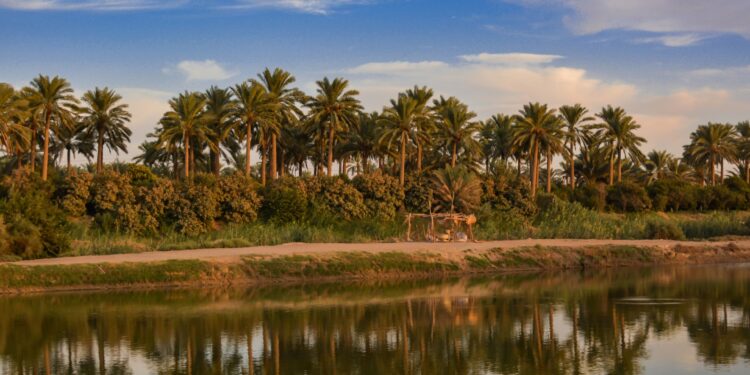Al -Jazeera Net Correspondents
The palm cultivation sector in Iraq is witnessing important and promising developments, as the Ministry of Agriculture announced a five -year plan to increase its numbers in Iraq to 30 million palm trees. The plan also includes cultivating luxury types for the first time using advanced tissue planting technology.
The repeated conflicts that afflicted the country, since the 1980s, were formed due to wars, since the Iran -Iraq war, then the Gulf War in 1991 and then the 2003 war that ended in the invasion and occupation of Iraq, not to mention the environmental challenges of drought, diseases, neglect and bulldozing for urban projects or alternative crops, The reason for losing vast areas of fertile land and a noticeable decline in the numbers of palm trees.
Luxury types of dates
Muhammad al -Khuza’i, the spokesperson for the Ministry of Agriculture, revealed a qualitative leap in palm cultivation in Iraq, where luxury types of dates are made for the first time using advanced tissue planting technology.
Al -Khuzai said in an interview with Al -Jazeera Net that the ministry aims to increase the number of palm trees to 30 million palm trees in the coming years, after the current number exceeded 22 million palm trees, which is a large number compared to the period between 2008 and 2010, in which it did not exceed 10 million palm trees as a result of wars and cruel bulldozing campaigns Which obtained the palm forests in Baghdad and several governorates.
Al -Khuza’i pointed out that this increase was achieved thanks to the major agricultural investment projects adopted by the ministry, which depend on the textile agriculture to produce luxurious types of dates, such as the Moroccan unknown, the Tunisian Nour, and the Saudi loyalty, in addition to the authentic Iraqi species such as Al -Barim, Al -Barahi and Al -Qarfali.
Al -Khuza’i stressed that this step will return to Iraq its prestigious position in the global dates market, where Iraqi exports are witnessing steady growth, as it exceeded 730 thousand tons in 2024, an increase of 80 thousand tons over the previous year, expecting another increase in exports during the current season, due to the increase in numbers Fruitful palm trees.
Al -Khuza’i considered that the dates production and agriculture plan is a “revolutionary plan”, as it depends on the latest agricultural technologies, by benefiting from the experiences of developed countries such as France and Britain, in addition to agreements with international research centers to provide Iraq with thousands of textile seedlings.
He stressed that these efforts will lead to a significant increase in the numbers of palm trees and the production of high -quality dates, and this will reflect positively on the Iraqi economy and increase exports.
Experts estimate the number of palm trees in Iraq, before the Iran -Iraq war in the 1980s at 32 million palm trees, while their numbers reached 11 million palm trees only after 2010, and the percentage of dates production decreased from more than 10% of the global production volume to 5% yet 2003, according to government data.
And the most famous types of Iraqi dates, such as Al -Zuhdi, Al -Khudrawi, Al -Barahi, Al -Anti Imran, Al -Qudhawi, Al -Shuwaithi and other rare species – whose producers are prohibited from exporting them abroad – have become threatened with extinction.
Private sector plans
Ahmed Sawad Hassoun, a member of the Executive Office of the Union of Agricultural Associations in Iraq, reduced the importance of the government’s plans to revive the palm sector in Iraq, stressing that until the moment he did not see any plan on the ground to develop this sector, with the exception of plans adopted by the private sector.
Hassoun said in an interview with Al -Jazeera Net that the wars, bulldozing of lands and neglect, negatively affected the cultivation of Iraq in general and the cultivation of palm trees in particular, as its numbers decreased to about a third after 2004 from what it was in the eighties of the last century, adding that Iraq is largely backward in all areas of agriculture Including palm cultivation, and that the government established farms and arranged laboratories, but it did not rise to the desired level.
He pointed out that palm cultivation did not see success for many reasons, including that the government program is incomprehensible, as Iraq is now ranked fifth in the Arab countries.
Hassoun explained that Iraq lacks the program and large factories capable of exporting dates products such as “molasses” honey, stressing that we do not have the export of the true sense of manufactured products, except in shy quantities from the private sector.
He indicated that the state does not have a distant or short -term strategic plan, indicating that they have great plans to advance the reality of palm cultivation, which only needs very simple matters and real support from government agencies, related to the protection of the product, factories and export plans.
Hassoun criticized the government facilities that he described as very shy, noting that the program – which was developed with the agricultural initiative, which provides for granting a loan to those who expands his orchard – is in itself another problem as it is irregular and there is no economic feasibility in it as tasted by corruption, as he put it.



